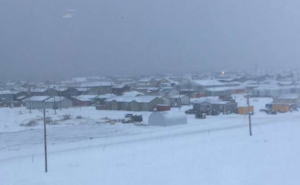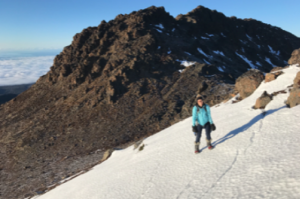

Alaska Native Medical Center


Nice view from the Hospital


Andrea on her Lecture Hike
As the students in EMU’s Physician Assistant program can attest, medical training is mentally and emotionally taxing. Especially during the clinical year of their training. In addition to participating in required rotations, students can choose from a number of elective rotations to enhance their training. Second year PA student, Andrea Thelen, chose to embark on an adventure that was first described to her by a resident she worked with while employed as a registered dietician. She wanted to participate in a rural health rotation in Alaska! She initiated the rotation because she wanted to prepare herself medically and culturally to work in a rural community where physicians are known to be scarce and health care needs on the rise. With the help of Professor Maria Keelon, Director of Clinical Education, and Jenifer Stanko, PA Clinical Coordinator, they established the rotation site and organized the rotation details and objectives.
Andrea’s four-week rural health rotation began in Anchorage, Alaska in November 2018 where she received Alaskan native culture orientation. This included a lecture hike through the mountains discussing pediatric malnutrition and medical disaster relief, as well as more traditional lectures on Alaska pathology and rural medicine and research. Andrea traveled to Nome for weeks two and three to begin clinical work at Norton Sound Health Corporation (NSHC). NSHC was an 18-bed critical access hospital that included inpatient and outpatient services. This health system served the Inupait and Yup’ik people of the Bering Strait region. Here, she had the opportunity to see patients in the Emergency Department, inpatient internal medicine service, and outpatient Primary Care Clinic. During the final week of the rotation, she traveled to Stebbins (population ~556 people) for training at a remote village clinic with no running water. She worked side-by-side a pediatrician, a pharmacist, a medical assistant, and multiple community health aides for three days and two nights performing mostly pediatric well child visits.
Her experience in Alaska has had a lasting impact on Andrea’s views on being a practicing physician assistant. “My experiences in Alaska has made my style of care and communication as a clinician more culturally sensitive. It has also instilled the importance of collectivism in patient care including team mentalities where the success of the group leads to the success of the individual.” Although there were challenges, such as having to quickly learn how to provide culturally sensitive care to a patient population with specific communication styles, different concepts of health care, and limited resources. Andrea felt that the awards of delivering health care to a population with limited access, and providing care to patients through every level of acuity far outweighed any challenges. She credits EMU’s Physician Assistant program faculty and staff who go the extra mile to create a positive environment that is conducive to learning. “I believe the coursework and clinical rotations within the program prepared myself and my classmates to be successful entry level Physician Assistants.” Professor Keelon believes that because of this experience, “Andrea will be able to better anticipate and address her patient’s needs, which leads to a more successful partnership for both the patient and the provider, and that leads to better health care.”

